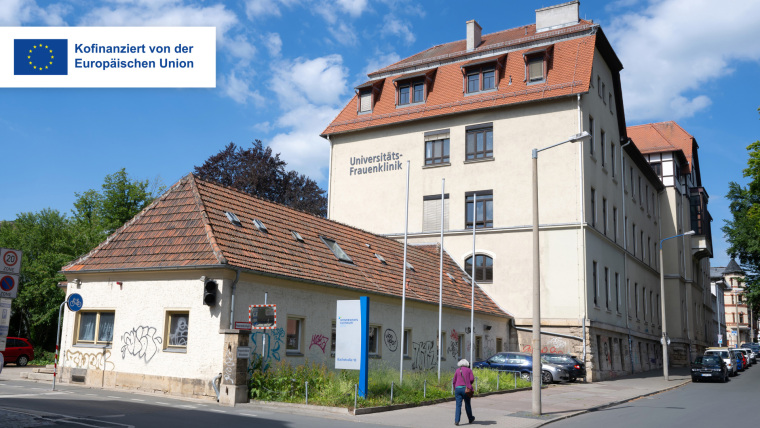
- Life
Published: | By: Stephan Krauß/Ute Schönfelder
Source article
The conversion phase of the Bachstraße complex in Jena into an inner-city science campus has begun with initial investigations into the building fabric of the former gynaecological clinic. In future, the site will be home to departments such as pharmacy and nutritional sciences. The actual construction work is expected to begin at the end of 2025 once the building application has been confirmed and the development plan has been approved. The project is scheduled to be completed by the end of 2029.
The Bachstraße complex is located in the immediate vicinity of Jena's city centre. It is home to large buildings from various eras that characterize the cityscape. Most of them – including two "high-rise bunkers" – were built specifically for medical purposes and have so far been used primarily by Jena University Hospital (JUH). Nearby are residential areas, numerous university facilities (e.g. the Ernst-Abbe-Platz campus), various educational and cultural centres and restaurants. The area covers 39,000 square metres, most of which (26,000 square metres) is owned by the state, some by the JUH (13,000 square metres) and a small part by the Ernst Abbe Foundation (e.g. the former "Handwerkerhöfe" on Carl-Zeiss-Straße).
With the construction of the new University Hospital in Jena-Lobeda, the premises were gradually vacated by the JUH. "Contrary to original plans, which intended the sale of this state-owned property, the state is making the site available for subsequent scientific use," says Thuringia's Science Minister Wolfgang Tiefensee. "The contiguous area in the immediate vicinity of the city and other university locations offers excellent development potential as the largest biomedical university campus in Central Germany."
Students benefit from the new campus
The state is providing a total of 54.3 million euros in ERDF funding and 27.2 million euros in state funding for the project until 2029. Friedrich Schiller University Jena and the German Aerospace Center (DLR) will contribute ten percent of the planned total expenditure to the financing of the project as future users. The total costs amount to around 90.6 million euros.
The modern and functional teaching and research infrastructure on the new campus will significantly strengthen the scientific competitiveness of Friedrich Schiller University Jena and its research network, says Prof. Dr Georg Pohnert, Interim President of the University. "Students in particular will benefit from the new science campus, as they will not only have access to laboratories, seminar rooms and lecture theatres in the newly designed buildings, but also areas for studying and communication. Excellent study conditions are particularly relevant for the training of pharmacists in Thuringia, especially as this currently has to take place in no longer functional and cramped rooms."
The planned construction project includes a new building and the renovation of the existing building of the former gynaecological clinic for the University as well as a new building for the DLR. A total of 8,575 square metres of floor space is to be created: 6,065 square metres for the Institute of Pharmacy and parts of the University's Institute of Nutritional Sciences and 2,511 square metres for the DLR Institute of Data Science.